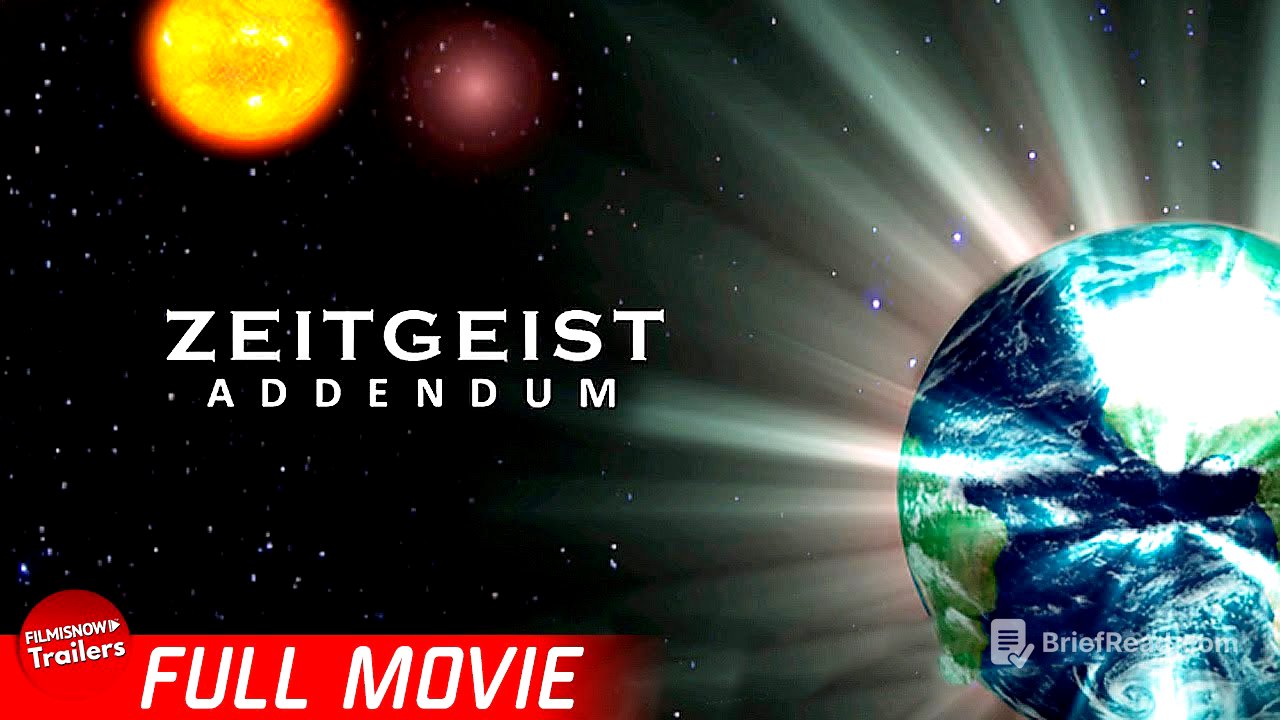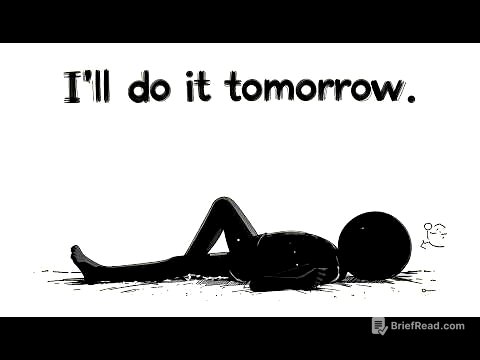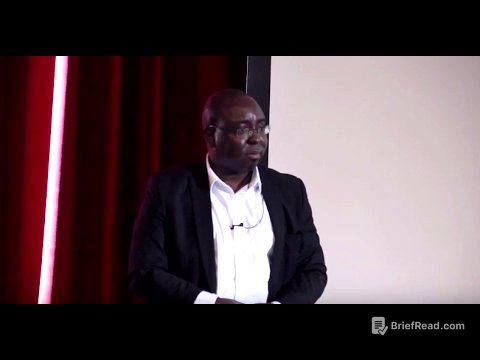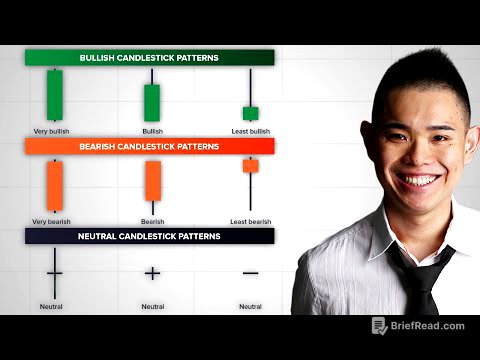TLDR;
This video explores the concept of monetary policy and its impact on society, arguing that the current system is inherently flawed and leads to economic inequality and social injustice. It presents an alternative vision for a resource-based economy, where resources are managed intelligently and made available to all without the need for money or employment.
- The current monetary system, based on fractional reserve banking, creates money out of debt, leading to inflation and perpetual debt for individuals and nations.
- Economic hitmen and global institutions like the World Bank and IMF perpetuate this system by indebting countries and exploiting their resources for the benefit of corporations.
- A resource-based economy, guided by technology and sustainability, could eliminate scarcity, poverty, and war, fostering a more equitable and prosperous world for all.
Intro [0:15]
The speaker discusses the obsolescence of old appeals to racial, sexual, and religious chauvinism, as well as rabid nationalist fervor. He suggests that personal identity and self-perception are fluid and subject to change based on individual choices. The speaker also touches on the idea of rejecting traditional notions of work, job, and savings, advocating for a shift in perspective to discover one's true self.
The Crisis in Consciousness [1:58]
The speaker emphasizes the importance of bringing about a radical revolution in the human mind, as the current state of the world is marked by misery, conflict, destructive brutality, and aggression. He argues that humanity remains brutal, violent, aggressive, and acquisitive, leading to the construction of a society along these lines.
The Monetary System [4:26]
The speaker asserts that society is composed of various institutions, including political, legal, religious, social class, familial values, and occupational specialization, which profoundly influence our understandings and perspectives. He highlights the monetary system as the most misunderstood and unquestioned institution, with its creation, governance, and societal effects largely ignored by the population. In a world marked by vast wealth inequality, child mortality due to poverty, and widespread poverty, the speaker argues that something is fundamentally wrong. He emphasizes the critical importance of understanding monetary policy to comprehend the current state of our lives, despite the intentional complexity and jargon used to conceal its true nature.
Modern Money Mechanics [6:58]
The speaker references "Modern Money Mechanics," a document by the Federal Reserve, to explain how money is created in a fractional reserve banking system. The government requests money from the Federal Reserve, which then buys government bonds by creating Federal Reserve notes. This money is deposited into a bank account, officially becoming legal tender and increasing the money supply. Only a small percentage of the money supply exists as physical currency, with the rest existing electronically. The government promises to pay back the money to the Fed, meaning money is created out of debt.
Fractional Reserve Banking [9:34]
The speaker explains how fractional reserve banking expands the money supply. When a deposit is made, a bank is required to hold a percentage as a reserve (e.g., 10%), while the rest can be used for new loans. The bank creates new money out of thin air when issuing loans, expanding the money supply. This process repeats as loans are deposited into other accounts, creating a cycle of money creation. For every deposit, about nine times that amount can be created out of thin air.
Inflation [12:28]
The speaker discusses how newly created money gains value by essentially stealing value from the existing money supply. As the total pool of money increases without a corresponding increase in goods and services, prices rise, diminishing the purchasing power of each dollar, a phenomenon known as inflation. Inflation is described as a hidden tax on the public, resulting from the distortion of money's value through its creation out of thin air. The fractional reserve system is inherently inflationary, as expanding the money supply without a proportional expansion of goods and services always debases the currency.
Money is Debt [14:30]
The speaker points out that in our financial system, money is debt and debt is money. Charts of the U.S. money supply and national debt from 1950 to 2006 show virtually the same trends. Every dollar in circulation is owed to someone by someone, as money comes into existence through loans. If everyone in the country paid off all debts, there would be no money in circulation. The last time the U.S. national debt was completely paid off was in 1835 after President Andrew Jackson shut down the central bank. As long as the Federal Reserve exists, perpetual debt is guaranteed.
The Application of Interest [16:34]
The speaker discusses the application of interest to loans, noting that almost every dollar that exists must eventually be returned to a bank with interest. However, only the principal is created in the money supply, leaving no money to cover the interest. This means the amount of money owed back to the banks will always exceed the amount of money available in circulation, making defaults and bankruptcy mathematically inevitable. This system invariably transfers true wealth from individuals to the banks.
Jerome Daly Court Case [19:25]
The speaker references a 1969 Minnesota court case involving Jerome Daly, who challenged the foreclosure of his home by arguing that the bank did not put up a legitimate form of property for the exchange. The bank's president admitted that the money was created out of nothing and that no law existed which gave him the right to do this. The court found that there was no lawful consideration, and Daly kept his home. This court decision implies that every time you borrow money from a bank, the money given to you is counterfeit and an illegitimate form of consideration, voiding the contract to repay.
Slavery is But the Owning of Labor [21:52]
The speaker discusses President Lincoln's decision to create an independent, debt-free currency called the greenback during the American Civil War. An internal document circulated between private British and American banking interests stated that capital should control labor by controlling wages, which could not be done if the greenback was allowed. The fractional reserve policy is a system of modern slavery, as people submit to employment to pay off debts created out of loans. The fear of losing assets, the struggle to keep up with perpetual debt and inflation, and the inescapable scarcity within the money supply keep the wage slave in line, powering an empire that benefits only the elite.
Economic Hitmen [25:14]
The speaker introduces the concept of "economic hitmen" who work to create a global empire by identifying countries with resources and arranging huge loans to those countries from institutions like the World Bank. The money goes to corporations to build infrastructure projects that benefit a few rich people, leaving the country with a huge debt they cannot repay. The economic hitmen then return and demand that the country sell its resources cheaply, allow military bases, or privatize essential services.
Case Studies of Economic Hitmen [27:15]
The speaker provides several case studies of economic hitmen in action, including the overthrow of democratically elected Mossadegh in Iran in the 1950s, the removal of Arbenz in Guatemala, and the assassination of Jaime Roldós in Ecuador. In each case, the United States intervened to protect corporate interests, often through covert operations and violence. Omar Torrijos, president of Panama, was also assassinated after he demanded fair treatment for his country and the return of the Panama Canal.
Venezuela and Iraq [34:26]
The speaker discusses the case of Hugo Chávez in Venezuela, who stood up to the United States and demanded that Venezuelan oil be used to help the Venezuelan people. In 2002, a coup was fomented against Chávez, but he was able to overcome it. The speaker also uses Iraq as an example of how the system works, with economic hitmen, jackals, and the military all being used to achieve U.S. objectives.
The Corporatocracy [38:47]
The speaker argues that the United States has created a clandestine empire, with more slavery in the world than ever before. The "emperor" of this empire is the corporatocracy, a group of individuals who run the biggest corporations and control the media, politicians, and government policies. These individuals are not elected, do not serve a limited term, and do not report to anyone. They operate under the primary assumption that they must maximize profits regardless of the social and environmental costs.
Globalization [40:51]
The speaker defines globalization as the process of manipulation by the corporatocracy through debt, bribery, and political overthrow. The World Bank and IMF serve this role on a global scale, putting countries in debt and imposing conditionalities such as currency devaluation, funding cuts for social programs, privatization of state-owned enterprises, and trade liberalization. These policies lead to environmental destruction, increased poverty, and a widening wealth gap.
The World is a Business [47:53]
The speaker asserts that the world is being taken over by a handful of business powers who dominate natural resources and control the money needed to obtain these resources, leading to world monopoly based on financial and corporate power. To deal with anyone who challenges the system, the establishment gave birth to the "terrorist," an empty distinction designed for any person or group who chooses to challenge the establishment. Despite the large amount of money spent on the so-called global war on terrorism, more people die from peanut allergies than from terrorist acts.
The True Terrorists [51:40]
The speaker argues that the true terrorists of our world wear five thousand dollar suits and work in the highest positions of finance, government, and business. To stop this system of greed and corruption, we must first find the true underlying cause, which is not the selfish, corrupt power and profit-based groups, but rather the symptoms of a deeper problem.
Corruption is a Monetary Invention [54:41]
The speaker defines corruption as a monetary invention and asserts that human behavior is environmentally determined. All nations are basically corrupt because they tend to uphold existing institutions. The most fundamental characteristic of our social institutions is the necessity for self-preservation. At the heart of this institutional self-preservation lies the monetary system, which provides the means for power and survival.
The Free Enterprise System [1:00:21]
The speaker argues that the free enterprise system, with its emphasis on self-interest and competition, invariably leads to strategic corruption, power and wealth consolidation, social stratification, technological paralysis, labor abuse, and a covert form of government dictatorship by the rich elite. Corruption is not some byproduct of monetaryism; it is the very foundation.
The Illusion of Democracy [1:04:04]
The speaker asserts that democracy is not possible in a monetary-based economy, as those with more money to advertise their position gain a differential advantage. Even honest, ethical politicians have no true relevance as to what makes our world and society function. It is technology, not politics, that solves problems.
Technology Solves Problems [1:05:49]
The speaker emphasizes that technology, not money, politics, or religion, is the true gift that has improved our lives. Applied technology is merely an extension of human attributes, reducing human effort and freeing humans from particular chores or problems. However, nothing produced in our profit-based society is even remotely sustainable or efficient.
Scarcity Increases Profits [1:09:40]
The speaker argues that scarcity, whether produced naturally or through manipulation, is a beneficial condition for industry, as it increases profits. Sustainability and abundance will never occur in a profit system, as it simply goes against the very nature of the structure. Therefore, it is impossible to have a world without war or poverty, to continually advance technology to its most efficient and productive states, and to expect human beings to behave in truly ethical or decent ways within a monetary system.
Eliminate the Causes of the Problems [1:11:15]
The speaker advocates for eliminating the causes of social problems, such as greed, bigotry, prejudice, and elitism, by eradicating the conditions that generate socially offensive behavior. War, poverty, corruption, hunger, misery, and human suffering will not change in a monetary system. It will take the redesign of our culture and values, related to the carrying capacity of the earth.
The Venus Project [1:12:45]
The speaker introduces the Venus Project, which proposes a society free of superstitions, incarceration, prisons, police, cruelty, and law. The professions that are no longer valid, such as stock brokers, bankers, and advertising, will disappear. The most important focus we can have is on the intelligent management of the earth's resources.
Resource-Based Economy [1:15:55]
The speaker contrasts a resource-based economy with a monetary system, stating that a resource-based economy is concerned with people and their well-being, while a monetary system has become so distorted that the concerns of the people are secondary. With all our technology today, we can create abundance and improve everyone's lifestyle.
Alternative Energy Solutions [1:17:07]
The speaker discusses alternative energy solutions, noting that solutions pushed by the establishment, such as hydrogen, biomass, and nuclear, are insufficient, dangerous, and exist only to perpetuate the profit structure. Clean, abundant, and renewable energy sources, such as solar, wind, tidal, wave, and geothermal power, could power the world forever.
Transportation [1:20:59]
The speaker discusses transportation, noting that battery technology needed to power electric cars exists but is limited due to battery patents controlled by the oil industry. He introduces maglev trains, which use magnets for propulsion and require less energy than plane travel. ET3 has established a tube-based maglev that can travel up to 4,000 miles per hour.
Machines Free People [1:24:07]
The speaker argues that machines free people from drudgery and repetitive jobs. In a high-technology resource-based economy, about 90% of all current occupations could be phased out by machines, freeing humans to live their lives without servitude. Many occupations today will have no basis to exist in a resource-based economy, such as anything associated with the management of money, advertising, and the legal system.
Laws Could Eventually Become Extinct [1:26:54]
The speaker asserts that laws could eventually become extinct, as virtually all forms of crime are a consequence of the monetary system. Instead of putting up a sign that says "drive carefully slippery when wet", put abrasive in the highway so it's not slippery when wet. The legal and prison systems are examples of how our society avoids examining the root causes of behavior.
Incentives Change [1:28:40]
The speaker argues that people are trained to believe that the monetary system produces incentive, but when you take money out of the scenario, different incentives arise. When people have access to the necessities of life, their incentives change. Education would be very different in a resource-based economy, with the major concern being mental development and motivating each person to their highest potential.
The Social Values of Our Society [1:32:50]
The speaker argues that the social values of our society, which have manifested in perpetual warfare, corruption, oppressive laws, social stratification, irrelevant superstitions, environmental destruction, and a despotic, socially indifferent, profit-oriented ruling class, are fundamentally the result of a collective ignorance of two of the most basic insights humans can have about reality: the emergent and symbiotic aspects of natural law.
The Emergent Nature of Reality [1:33:21]
The speaker explains that the emergent nature of reality is that all systems will undergo fluid perpetual change when uninhibited. We must be open to new information at all times, even if it threatens our current belief system. The tendency to blindly hold on to a belief system is a form of intellectual materialism.
The False Assumption of Separation [1:40:53]
The speaker discusses the false assumption of separation through the rejection of the symbiotic relationship of life. There is no such thing as independence in nature; the whole of nature is a unified system of interdependent variables. We must take into account the totality of the environment and understand that the whole world is the community.
It's Time to Claim the Unity [1:46:09]
The speaker calls for claiming the unity our outmoded social systems have broken apart and working together to create a sustainable global society where everyone is taken care of and everyone is truly free. The most important issue at hand is the intelligent management of the earth's resources, which can never be accomplished in a monetary system.
What We Must Do [1:49:36]
The speaker outlines several actions that must be taken to create a sustainable global society: expose the banking fraud, turn off the TV news, don't ever allow yourself or anyone you know to join the military, stop supporting the energy companies, reject the political system, and join the movement. The only way the establishment will change is by our refusal to participate while continuously acknowledging its endless flaws and corruptions.
The Real Revolution [1:56:40]
The speaker concludes by stating that the most relevant change must occur first inside of you. The real revolution is the revolution of consciousness, and each one of us first needs to eliminate the divisionary materialistic noise we have been conditioned to think is true while discovering, amplifying, and aligning with the signal coming from our true empirical oneness.









